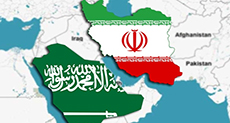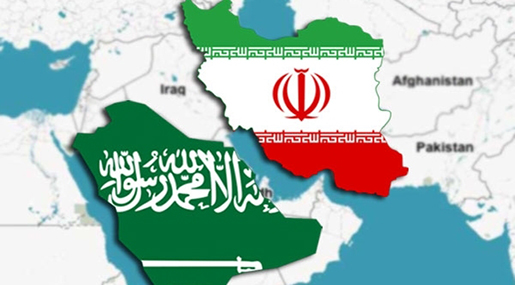
Saudi Arabia: Iran is The Ideal Enemy

Nasri Sayegh
Saudi Arabia is no longer as it was. Cold wars do not suit it. Hidden battles are of no use. Dependence on the arms of others is not enough...it is before a new phase. It faces real dangers. It feels that it is surrounded by large and small enemies. The greatest enemy is Iran. The smaller enemy is its fear of internal [issues]...in short; the kingdom is not in good shape. The sum of the previous five year indicates a significant decline and the occurrence of failed battles.

What it lost in politics and diplomacy, it will regain through force. Whoever thinks that it is a paper kingdom, or a mere storage of [wealth], or [merely] oil wells, should think again and revisit his outlook...the relatively besieged kingdom decided to lead the battle to defend itself everywhere - here, there, and throughout the world. The media is on its side. It lost some of the [media support] after the wave of migration to Europe. The Western press dared to hold it responsibility for the production of the "jihadists". Some referred to its previous involvement in [religiously] mobilizing, delivering, training, arming and funding. Even Thomas Friedman wrote against [Saudi Arabia]. "Daesh" was considered a Saudi ideological creation, even though the organization later rebelled against the kingdom.
The kingdom is not weak at all. It has storages of modern weapons. Its arsenal does not stop asking for more. $24 billion is the value of arms purchases from the United States in the last 18months. No one is stingy towards them, and many encourage it to [spend] more. For this reason, it decided to wage its military battles itself in Yemen, and it amassed beside it Arab followers, and so they supported it with little numbers and much talk. The decision of the kingdom: there will be no peace in the region without Saudi Arabia. There will be no solution before Iran returns back to its borders [and this means the evacuation of the arena for itself alone, not even to be shared with Qatar and Turkey]...something related to dreams and nightmares pressuring those who monopolise power in the kingdom.
The increasing trend of resorting to military force, and relying on the policy of confrontation, and adopting the diplomacy of the fist, and issuing threats through the imposition of sanctions, has been added to the tendency of the ruling "troika", which is aimed at resolving the battle of inheritance, which has yet to wane. It is expected that there will be a firmer hold [on power] by Salman. It is thought that winning battles abroad brings down the internal "enemy brothers" with ease and calm, in which case there would be no need for plots [within] the [royal] court.
However, this is not accurate. This is wishful analysis that is not true. The kingdom does not need all these conflicts for the sake of implementing a peaceful transition internally...the problem of Saudi Arabia is not in its ruling family [the family is a problem of a different kind]. Rather, the problem is in what this family has accumulated, and what those who preceded it [accumulated], from losses on many fronts, such that it seems like a fragile state, with no outlook, floundering blindly, the accumulation of errors and failures, in a changing world, in a region that is overturning and which does not appear close to calming down.
The kingdom's losses are many, despite what it enjoys of power, influence, support, and protection. It was the concubine of the West. Perhaps it was the only one that received this exceptional status, with a Western consensus towards it. Israel [of course] surpasses it in this field. Saudi Arabia was forgiven for all of its adventures. The West is "forgiving, merciful" [towards it], because it yields wealth and energy, and adopts policies that very much satisfy the former...the losses of the kingdom are many, on various fronts. "Political wisdom" dictates taking Iran as an enemy.
"Israel" can no longer be [an enemy] at all. Iran is an ideal enemy, the kingdom is able to mobilise [forces] against it, Arab regimes, Sunni states, the jihadists in the battlefield, in addition to a calculating and alert West. The political pilgrimage to Mecca provides a platform for the kingdom to target Iran and all those who are linked to it. Iran is restricted after the nuclear deal, by prudence. It is bound by international regulations, and by its success in the entrance exam of the international community, with the appropriate respect, and openness that secures gains. The staggering investments have begun to flow to Tehran, as if it were the capital that will rescue economies in crisis in the Western capitalist states.
Saudi Arabia has lost the battle relating to the nuclear agreement with Iran. Iran is now a great regional power, which is a part of the international system, with complete membership that does not include ambiguities. What Riyadh fears is that Tehran begins to compete with the "Great Satan" in its own home at the same time. Iran has beaten it to the inheritance of America after its invasion. [Iran] has now become a decisive player in determining the fate of Iraq, whether during peace time or war. The losses of Saudi Arabia in Iraq cannot be covered by the battles of the "jihadists and Islamists" in Syria. The Russia-Iranian alliance has attracted towards it the "American friend".
The parameters of the Geneva negotiation table have been drawn up without the approval of Saudi Arabia. The kingdom is disappointed...it has lost its bets in Yemen. It won the opportunity to destroy its neighbour. What drives the Syrian regime to bomb civilians, it has outdone it. Yemen, after and during the "Decisive Storm", has become ruins. The crime is one in two countries of opposites. The successes that it has mastered in nipping the "Arab Spring" in Bahrain, and in taking revenge from the Egyptian spring and the rule of the Muslim Brotherhood within it, by supporting the present military rule.
Iran is the ideal enemy of Saudi Arabia, yet the time is up. The world is very much changing. The indications of the cracking of the Western protection of the kingdom have begun to appear. Especially after the attacks of "Daesh" in Paris, and the threat the organisation poses to all Western states, Western media has begun to raise the finger of blame towards Saudi Arabia. Many politicians are shaking their fists after a long period of treating [it] with gentlemen diplomacy. Some have crossed the line. They said with full confidence: "We refuse to remain slaves of Saudi money".
They act with caution towards Saudi Arabia's future. They fear that its wealth will be [the very source of] a revolution against itself. They see that what the West is complaining about today might be something they weep over in the future. A lesson that is perplexing is the changing of Arab regimes that existed before the "Arab Spring", and the coming of [regimes/players] that are worse than it...the West no longer believes Saudi Arabia, nor does it have faith in its future. [The West] asserts that the war against "Daesh" will not bear fruit unless the sources of funding are struck, as well as the sources of its ideology, which are found in "Wahhabism".
Iran faces the Saudi concern with open ease. The roads that lead to it are open. The roads from it widen. [Iran's] role will be taken into account with regards to the Arab regional vacuum, while Saudi Arabia's role does not exceed the defense of itself. While [Saudi Arabia] seeks for Iran to be Shia and Persian only, it is faced with an Iran that has become [also] Iraqi, Syrian, Yemeni, Lebanese, and things will only increase. Bets lie on the stronger [side], and the difference in power between Iran and Saudi Arabia is huge. The former continues to gain victories and increase its balance, while the latter spends from its balance and continues to lose...
What is unfortunate is that the Arabs will not become partners after the war. Saudi Arabia is first and foremost Sunni, and artificially Arab. Its positive role makes it a candidate for a bias towards reconciliation, and not towards the instinct of bloodshed...the kingdom must change its enemy, as Iran is an ideal enemy, and not weak at all.
Source: As-Safir Newspaper, Translated and Edited by website team
Comments
person Mohamed Hujj Hassan
Wake UP
You make it seem like the west has nothing to do with Daesh and its all Saudi, the west does not care if Daesh attack their countries and kill their people it is the west that trains them. They are complicit with Saudi money. wake up .


